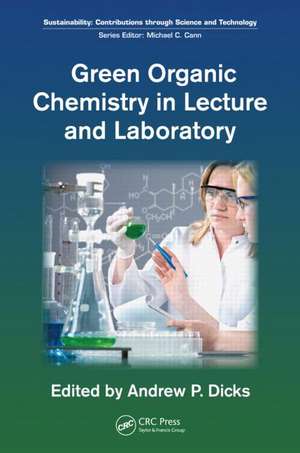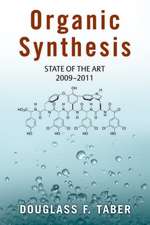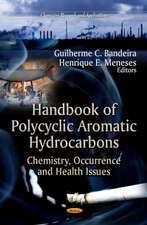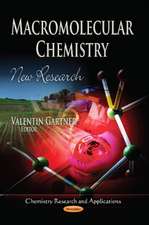Green Organic Chemistry in Lecture and Laboratory: Sustainability: Contributions through Science and Technology
Editat de Andrew P. Dicksen Limba Engleză Hardback – 29 aug 2011
Encouraging a stimulating organic chemistry experience, the text emphasizes the need for undergraduate education to:
- Focus on teaching sustainability principles throughout the curriculum
- Be flexible in the teaching of green chemistry, from modification of an existing laboratory experiment to development of a brand-new course
- Reflect modern green research areas such as microwave reactivity, alternative reaction solvents, solvent-free chemistry, environmentally friendly reagents, and waste disposal
- Train students in the "green chemistry decision-making" process
| Toate formatele și edițiile | Preț | Express |
|---|---|---|
| Paperback (1) | 487.56 lei 3-5 săpt. | +20.86 lei 7-13 zile |
| CRC Press – 16 noi 2016 | 487.56 lei 3-5 săpt. | +20.86 lei 7-13 zile |
| Hardback (1) | 1330.16 lei 6-8 săpt. | |
| CRC Press – 29 aug 2011 | 1330.16 lei 6-8 săpt. |
Preț: 1330.16 lei
Preț vechi: 1622.15 lei
-18% Nou
Puncte Express: 1995
Preț estimativ în valută:
254.55€ • 264.25$ • 212.26£
254.55€ • 264.25$ • 212.26£
Carte tipărită la comandă
Livrare economică 22 martie-05 aprilie
Preluare comenzi: 021 569.72.76
Specificații
ISBN-13: 9781439840764
ISBN-10: 1439840768
Pagini: 298
Ilustrații: 2 equations; 8 Tables, black and white; 248 Illustrations, black and white
Dimensiuni: 156 x 234 x 18 mm
Greutate: 0.54 kg
Ediția:UK edition
Editura: CRC Press
Colecția CRC Press
Seria Sustainability: Contributions through Science and Technology
Locul publicării:Boca Raton, United States
ISBN-10: 1439840768
Pagini: 298
Ilustrații: 2 equations; 8 Tables, black and white; 248 Illustrations, black and white
Dimensiuni: 156 x 234 x 18 mm
Greutate: 0.54 kg
Ediția:UK edition
Editura: CRC Press
Colecția CRC Press
Seria Sustainability: Contributions through Science and Technology
Locul publicării:Boca Raton, United States
Public țintă
Instructors, researchers, teachers in organic green chemistry; graduates, post doctoral researchers in chemistry; chemical engineers.Cuprins
Introduction to Teaching Green Organic Chemistry. Green Organic Chemistry Lecture Case-Studies. Elimination of Solvents in the Undergraduate Organic Laboratory. Organic Reactions under Aqueous Conditions. Organic Reactions in Greener Non-Aqueous Media. Using More Environmentally-Friendly Organic Reagents. Green Organic Reactions under Microwave Heating.
Notă biografică
Andrew P. Dicks (Andy) joined the University of Toronto Chemistry Department in 1997. Following promotion in 2006, he became Associate Chair for Undergraduate Studies for two years and developed an ongoing interest in improving the student experience in his department. He has won several pedagogical awards, including the University of Toronto President’s Teaching Award, the Canadian Institute of Chemistry National Award for Chemical Education, and most recently a 2011 American Chemical Society-Committee on Environmental Improvement Award for Incorporating Sustainability into Chemistry Education. His work has lead to over twenty peer-reviewed publications in the chemical education literature.
Dr. Dicks’ research interests are within the field of undergraduate education, currently with specific emphasis on designing new microscale and semi-microscale green organic laboratory experiments.
Dr. Dicks’ research interests are within the field of undergraduate education, currently with specific emphasis on designing new microscale and semi-microscale green organic laboratory experiments.
Recenzii
"Green Organic Chemistry in Lecture and Laboratory is a valuable compilation of classroom and laboratory examples suitable for undergraduate organic chemistry. … Educating students about environmentally friendly alternatives to traditional solvents, reagents, and reaction conditions fosters critical thinking and promotes sustainability through green chemistry. Green Organic Chemistry in Lecture and Laboratory is a useful reference book that will assist faculty in fostering these skills in their students."
—Mary M. Kirchhoff, American Chemical Society, in Journal of Chemical Education, 2013
"This book is clearly directed at anyone who is interested in designing and implementing a green organic chemistry course, either by ‘greening’ existing courses or by launching a new course. It will provide the reader with an extensive source of information on the recent advances that have been made in green chemistry educational material for use in undergraduate curricula. The clear and concise layout of the book allows readers to target specific areas they are interested in, but the chapters are also properly cross-referenced for more in-depth reading. Case studies from academic and industry perspectives throughout the book provide real life examples and demonstrate the big picture application of course content."
—Louise Summerton of York University, U.K., in Chemistry Industry, 2012, 76(2), 46-47
"This book helps to bring the world of green chemistry to not only the scientists and engineers of the future, but also to our prospective political leaders, economists, business leaders, teachers and world citizens."
— Michael Cann, Chemistry Department, University of Scranton
"[This book] covers a wide range of key themes, ranging from the 12 principles of green chemistry via various different approaches to conventional synthetic procedures, waste management and waste valorisation.
What is vital to emphasise to students and to researchers is that any given technique is not necessarily green; rather it is how it is used that will decide this. ... This book makes this point several times, which is refreshing. This indicates care and depth , and should be repeated to ensure students are able to critically evaluate the reality of a case, rather than simply tick a box.
The book is detailed and very readable – it is certainly a valuable addition to the area."
—Duncan Macquarrie, Chemistry World, July 2012
"The principles of green chemistry should be taught to all undergraduates, but most of the available books on green chemistry do not, to my mind, provide the industrial focus, particularly the process chemistry focus, that is necessary. All that has changed with this new book, which, in most chapters, puts an industrial emphasis on the principles of green chemistry. … Overall I enjoyed reading this practical book … . The book is highly recommended to all interested in green chemistry."
—Dr. Trevor Laird, Editor, Organic Process Research & Development, March 2013
—Mary M. Kirchhoff, American Chemical Society, in Journal of Chemical Education, 2013
"This book is clearly directed at anyone who is interested in designing and implementing a green organic chemistry course, either by ‘greening’ existing courses or by launching a new course. It will provide the reader with an extensive source of information on the recent advances that have been made in green chemistry educational material for use in undergraduate curricula. The clear and concise layout of the book allows readers to target specific areas they are interested in, but the chapters are also properly cross-referenced for more in-depth reading. Case studies from academic and industry perspectives throughout the book provide real life examples and demonstrate the big picture application of course content."
—Louise Summerton of York University, U.K., in Chemistry Industry, 2012, 76(2), 46-47
"This book helps to bring the world of green chemistry to not only the scientists and engineers of the future, but also to our prospective political leaders, economists, business leaders, teachers and world citizens."
— Michael Cann, Chemistry Department, University of Scranton
"[This book] covers a wide range of key themes, ranging from the 12 principles of green chemistry via various different approaches to conventional synthetic procedures, waste management and waste valorisation.
What is vital to emphasise to students and to researchers is that any given technique is not necessarily green; rather it is how it is used that will decide this. ... This book makes this point several times, which is refreshing. This indicates care and depth , and should be repeated to ensure students are able to critically evaluate the reality of a case, rather than simply tick a box.
The book is detailed and very readable – it is certainly a valuable addition to the area."
—Duncan Macquarrie, Chemistry World, July 2012
"The principles of green chemistry should be taught to all undergraduates, but most of the available books on green chemistry do not, to my mind, provide the industrial focus, particularly the process chemistry focus, that is necessary. All that has changed with this new book, which, in most chapters, puts an industrial emphasis on the principles of green chemistry. … Overall I enjoyed reading this practical book … . The book is highly recommended to all interested in green chemistry."
—Dr. Trevor Laird, Editor, Organic Process Research & Development, March 2013
Descriere
The last decade has seen a huge interest in green organic chemistry, particularly as chemical educators look to "green" their undergraduate curricula. Detailing published laboratory experiments and proven case studies, this book discusses concrete examples of green organic chemistry teaching approaches from both lecture/seminar and practical perspectives. Leading contributors address such topics as the elimination of solvents in the organic laboratory, organic reactions under aqueous conditions, organic reactions in non-aqueous media, and organic reagents. This reference allows instructors to directly incorporate the material presented in the text into their courses.



















